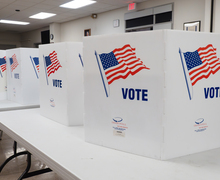Peaceful participation
Syracuse University will host a series of panel discussions today on solutions for world peace.
Nicci Brown, the associate vice president of marketing and interactive media for Syracuse University, said the discussion, titled ‘Small World/Big Divides: Building Bridges in an Age of Extremes,’ shows how SU is playing its part as a global citizen.
‘What we really want (the speakers) to do is to identify the things that have been successful in achieving peace so that we can start to translate them,’ Brown said, who organized the event, ‘and see how people on the ground in Syracuse and in other parts of the world can do things that are going to have a positive impact – strategies that will help create world peace.’
The event will take place from 1 p.m. to 4:30 p.m. in Goldstein Auditorium. It will also be covered by CBSnews.com, broadcast on C-SPAN and available as a live Web cast at buildingbridges.syr.edu.
‘We will have people watching from throughout the world,’ Brown said. ‘They’ll be watching at Tel Aviv University, and we’re encouraging members of the community at SU centers abroad to be involved as well.’
The summit is broken into two main sessions, following a brief video address and remarks from Chancellor Nancy Cantor.
The first session will begin with Hanan Ashrawi, a Palestinian legislator and scholar, Itamar Rabinovich, the president of Tel Aviv University and Dennis Ross, an author and diplomat, who will all discuss the current conflict in Israel and Lebanon.
‘We’re calling it an unfolding dialogue, so after we have the initial session, we will start bringing in other members as the conversation unfolds,’ Brown said. ‘So really what we’re doing is building a rich dialogue which will be focused on things that have worked, and things that haven’t worked so that we can isolate them.’
One of these additional members is Rami Khouri, an SU graduate who is currently the editor at large of a Beirut-based newspaper, The Daily Star.
‘The academic community can have a lot to contribute to public discussion,’ Khouri said. ‘We can help people in this country understand the Middle East reality isn’t presented. The public needs a more complete view of events.’
After all the panel members have joined the conversation, there will be a break during which the participants can submit questions, Brown said. Attendees can submit questions through text messaging, an e-mail station or through the event’s Web cast available on its Web site. Questions can currently be submitted through its Web site.
During the second session, the questions will be submitted to the panel. David Crane, a distinguished visiting professor of law, will act as moderator.
‘I want to involve both students and citizens in the dialogue,’ Crane said. ‘I think that we will focus on the four freedoms that FDR established: the freedom of speech, the freedom of worship, the freedom from want and the freedom from fear.’
Crane was the chief prosecutor of the Special Court for Sierra Leone, where the court tried criminals responsible for war crimes and the murder and rape of 1.2 million human beings.
‘I think that this is a bold move for Syracuse and Chancellor Cantor,’ he said. ‘It will place Syracuse on the map as a movement to resolve conflict peacefully, instead of the kinetic energy of war.’
The term ‘summit’ is purposefully used to describe today’s event, Brown said.
‘One of the reasons we did that is that this is a way to remind people that so-called ordinary citizens can take back the responsibility to find solutions to world peace, rather than just leaving it to heads of state alone,’ she said.
Following the discussions, there will be a concert featuring Matisyahu, The Human Orchestra and State Radio at the Landmark Theater at 7:30 p.m.
‘Music can reach us in a place where words alone can’t reach us,’ Brown said.
She also said the concert will echo the conversation’s message of peace and understanding.
‘There is a strong message of peace interwoven throughout Matisyahu’s lyrics, and State Radio is focused on getting young people to take an interest in politics and world affairs,’ she said.
Society has to stake in issues relating to world peace and figure out what it can actually do, Brown said.
‘One of the goals for this event is to figure out what people can do at the so-called grassroots level that can have ripple effects that may impact people across the world,’ she said. ‘I think that one of the things (Sept. 11) really emphasized for us is that we can’t act in isolation. Everything we do has some kind of effect. This is a way for us to discuss what things we can do here in Syracuse, in central New York, in the United States that can have a positive effect on these conflict areas.’
Published on October 16, 2006 at 12:00 pm





